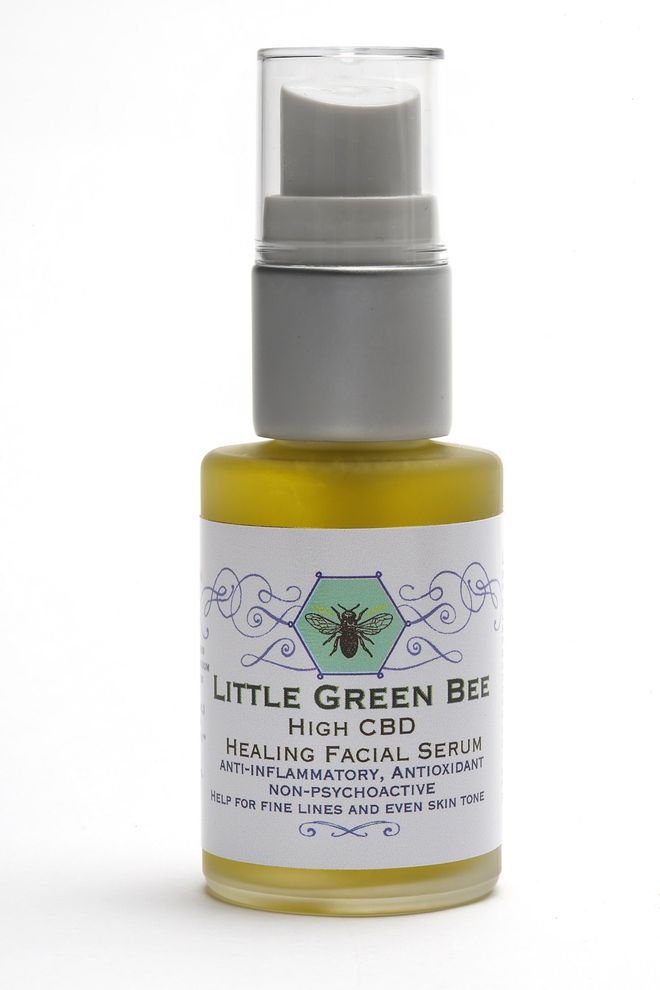New frontiers open for cannabis dermatology

Cannabis has been used to treat pain, alleviate anxiety and depression, and ease neuropathy. Now some dermatologists say it may also improve skin health. While there are no FDA trials of cannabis’ effect on the skin — because cannabis is still federally categorized as a Schedule 1 drug with no accepted medical use — studies so far suggest that weed’s active ingredients, cannabinoids, may help regulate inflammation and immune function and create more youthful-looking skin.
You don’t have to explain it to Robbie Shakespeare, a 42-year-old flight attendant and mother of four in Tracy. In 2015, she got what she at first thought was ringworm from her hobby, the grappling-focused martial art form jujitsu. A circular, red, scabby rash appeared on her forearm and soon enveloped the entire forearm.
“It was ugly. It was itchy. People didn’t want roll with me. They said, ‘You’ve got ringworm.’ I’d say, ‘No, I don’t!’”
And she didn’t. Shakespeare went to a dermatologist several times. “They did three biopsies that left permanent scars. It was a non-fungal, nonviral infection — they just didn’t have an answer,” she said.
Her cure arrived at a mixed martial arts event, where she ran into a regular at the fights, Ed Breslin, a director at the cannabis topical company Xternal.
“He said, ‘What’s this on your arm?’” Breslin told her to “take this and try it. I want to know if it works.”
“Three days later the rash was almost gone,” Shakespeare said. “Within eight days, it went away and it stayed away.”
When she told her dermatologist about her cure, the dermatologist told Shakespeare, “It doesn’t surprise me.”
Cannabis Dermatology
The skin contains nerve cell receptors that respond to the ingredients in cannabis. These cannabinoid receptors manage inflammation and immune function — both key to skin health. Although few placebo-controlled human trials have been conducted, there are dozens of lab, cell and animal studies, as well as many patient self-reports suggesting that using cannabinoids for skin care is safe and effective.
At least a half dozen pharmaceutical companies are working through Food and Drug Administration channels to bring cannabis skin care products to market. And non-FDA-approved versions like Xternal are already on shelves in states that have legalized it.
“This might be an affordable treatment for eczema, acne and psoriasis that doesn’t have the side effects of steroids,” said Dr. Robert Dellavalle, a professor of dermatology at the University of Colorado School of Medicine and lead author of the study “The Role of Cannabinoids in Dermatology,” published in April in the Journal of the American Academy of Dermatology.
Based on his findings, Dellavalle is optimistic cannabis can be especially beneficial for relieving itchy skin. “Rashes cause the greatest burden of skin disease in the world,” he said.
Maria Mangini, a Berkeley nurse practitioner, points patients to cannabinoids for a variety of skin conditions.
“I think members of the public don’t know how useful cannabis can be for diseases of the skin, especially inflammatory disease,” she said.
The skin is part of the body’s endocannabinoid system. First discovered by a group of researchers in the 1990s, this system helps the body regulate various biological processes, such as inflammation, immune function, sleep, appetite and mood.
Mangini said you can think of pot on the skin as a natural supplement to the body’s self-made cannabinoids. Conditions like fibromyalgia and psoriasis “may turn out to be endocannabinoid-deficiency disorders.”
Dellavalle isn’t allowed to study cannabis unless he does so with a pharmaceutical company running FDA trials, so he’s visiting dispensaries and collecting data from patients who use cannabis topicals for pain and itch relief. So far, he’s found effectiveness to vary, but he said the time is ripe such studies. Other skin researchers agree.
“I predict this field is just in its infancy and is going to explode,” said Dr. Jeanette Jacknin, a leading holistic dermatologist based in Encinitas (San Diego County), who has been researching topical cannabinoids. She says cannabis topicals can be as effective as some other beauty and medicinal products, “but like other things in holistic medicine, I think topical cannabinoids, terpenes (pot’s aroma molecules) and hemp are a powerful addition that should be used together with other modalities and ingredients to effect the best results.”
Dellavalle said that while using cannabis on the skin could potentially cause you to fail a drug test, it won’t get you high. And if the anecdotal evidence of its effectiveness proves true, it could provide many benefits and low risks.
Millions of Americans with skin diseases are a potentially massive market for breakthrough pot topicals. “What it needs is some young, energetic practitioner to be the pointy end of the research spear,” Mangini said.
Maria Finn is an author, journalist and speaker in Sausalito. Cannabis Editor David Downs contributed to this report.
